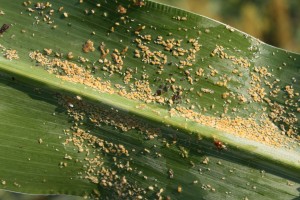I wrote an article last week about a find of white sugarcane aphids in Madison County. Aphids have now also been found in Shelby and Dyer Counties, so it seems likley they could be found in any sorghum field in west Tennessee. I must emphasis that overall populations are very low and don’t appear to pose an immediate threat to our crop. Indeed, my suspicions are that white sugarcane aphids will require treatment on few if any fields in Tennessee. For many fields, it would appear they have shown up too late to pose a substantial threat.
Having said that, it is still important to be alert for this pest for several reasons.
- There is still time in late maturing sorghum fields for aphid populations to build. Like many aphid species, populations can grow dramatically under the right conditions.
- White sugarcane aphids can cause problems even in fields that are near maturity. One of the biggest problems encountered with this pest is the accumulation of honeydew and sooty mold on plants near harvest, so much so that it gums up combines.
- This new insect has spread rapidly. I once thought this was going to be only a Deep South problem. It now appears that white sugarcane aphids may to pose a threat to sorghum in the coming years. Thus, it would be nice to document how common and where they occur in the state.
 Though I hope it proves unnecessary, I have requested a Section 18 (emergency exemption) for the use of Transform 50WG in sorghum. Research indicates this insecticide is the best choice for controlling white sugarcane aphids. Current labeled insecticides in sorghum either provide no or inconsistent control, and/or pre-harvest application restrictions prevent their use.
Though I hope it proves unnecessary, I have requested a Section 18 (emergency exemption) for the use of Transform 50WG in sorghum. Research indicates this insecticide is the best choice for controlling white sugarcane aphids. Current labeled insecticides in sorghum either provide no or inconsistent control, and/or pre-harvest application restrictions prevent their use.


Since this article was written I have seen or been told about building or treatment level infestations in Hardin, Hardeman, Haywood and Fayette Counties. It’s clear now that sugarcane aphids will be an issue in at least some areas.
Are you thinking it will be more of a harvest issue now based on the maturity of the grain sorghum?
I think it will mostly a harvest issue on most of our earlier sorghum fields … and some have already beat the aphids However, I’ve had a number of people mention sorghum that is just heading (or about to). These are the fields I am most concerned could need multiple applications. Some of that depends on how quickly everything develops, but it has progressed quickly this past week,